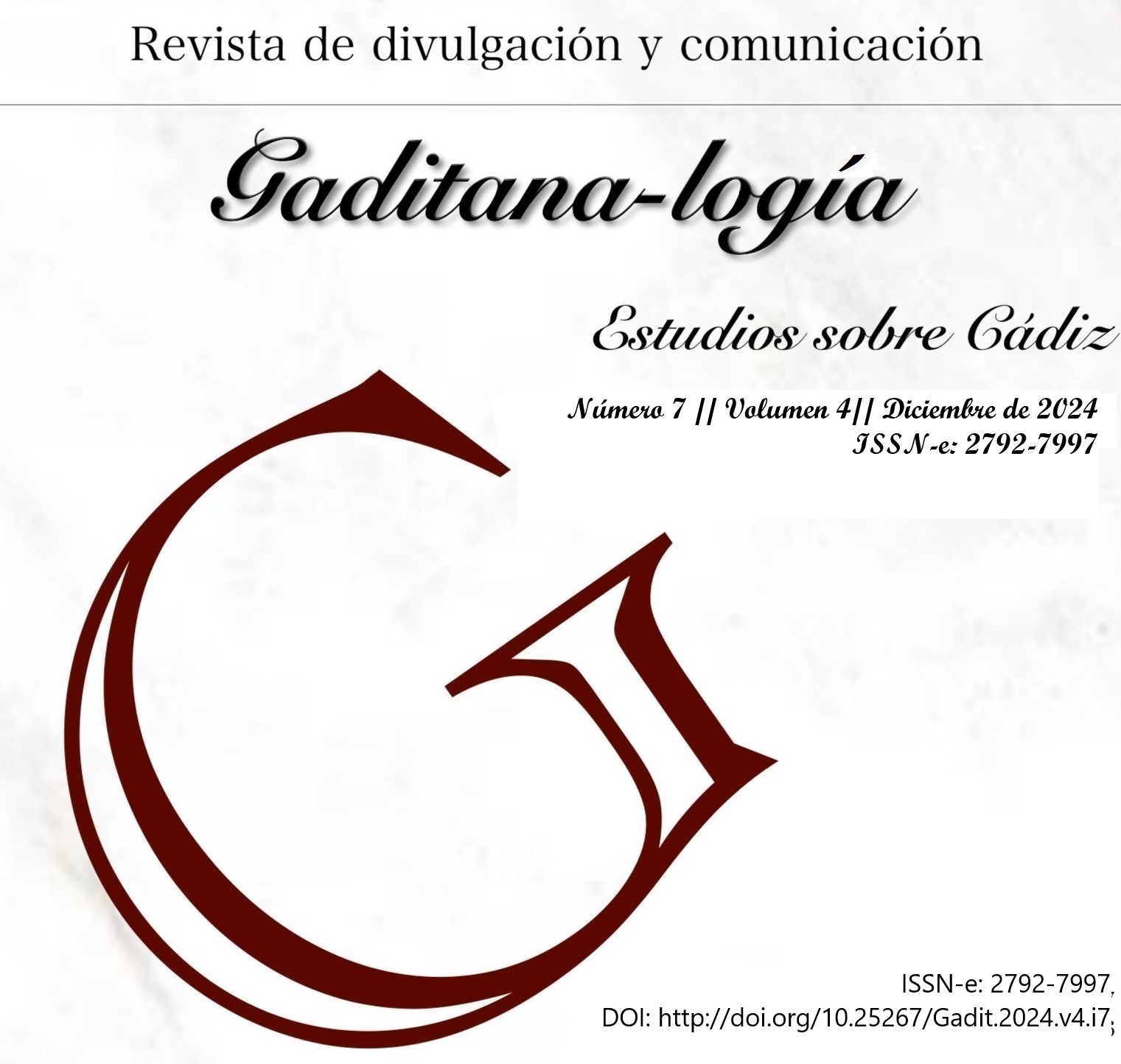The concept of Spain as a Nation in the Cortes of Cádiz.
Abstract
The Constitution of 1812 encourages important consideration of the concept of the Nation. The absolute power of the monarch is diluted between the articles established by the Cortes of Cádiz. In these years, the origin of the new power of the State will be forged. Furthermore, within the framework of the Constitution of Cádiz, the new configuration of the State is proposed. Overcoming the dictates of the Old Regime and opening the way to a New Regime; rising an innovative design inspired by a uniform Jacobin centralism inherited from the French Revolution. Cádiz and its Constitution of 1812 star in a splendid page of the contemporary history of Spain, projecting itself into the territories of America. In this sense, this article makes room for reflection regarding the concept of Spain as a nation in the Cortes of Cádiz.
Keywords
Downloads
How to Cite
License
Copyright (c) 2024 Gaditana-logía

This work is licensed under a Creative Commons Attribution-NonCommercial-NoDerivatives 4.0 International License.
References
(1) ESTEBAN, Jorge DE, Tratado de Derecho Constitucional, Universidad Complutense, v. I, Madrid, 2001, pág. 56.
(2) VARELA SUANCES CARPEGNA, La teoría del Estado en los orígenes del Constitucionalismo hispánico, Madrid 1983, pp. 221-269.
(3) Sobre este fenómeno, véase de MORENO ALONSO, Manuel, La generación española de 1808, Alianza Editorial, Madrid, 1989).
(4) SOLIS, Ramón, Cara y Cruz. La primera Constitución española, Revista de Estudios Políticos núm. 162, noviembre-diciembre, Madrid, 1962, pág. 146.
(5) DOMINGUEZ ORTIZ, Antonio, España, Tres Mil años de Historia, E. Marcial Pons, Madrid, 2001, pág. 255.
(6) SANCHEZ AGESTA, Luis, Historia del Constitucionalismo Español, Centro de Estudios Constitucionales, Madrid, 1987, pág. 37.
(7) GARCIA LEON, José María, Los diputados doceañistas. Convocatoria, práctica electoral, funcionamiento y reglamentación de las Cortes, t. I, E. Quorum, Cádiz, 2012, pág. 43.
(8) Diario de Sesiones de Cortes, 26 agosto 1811).
(9) JARDI, Enric, Els catalans de les Corts de Cadis, Barcelona, 1963, pág. 52).
(10) Diario Mercantil, 4 noviembre 1810.
(11) El Patriotismo a la moda. Sátira de FPV, Cádiz, imprenta de Manuel Jiménez Carreño. La misma intencionalidad crítica se puede comprobar en la comedia en tres actos El Patriota en Cádiz, por José Morante, 1813.
(12) Centinela contra los franceses, Manresa, 1808, pág. 46, citado por José María GARCIA LEON, ob, cit, pág. 168.
(13) LOVETT, Gabriel H, La Guerra de la Independencia y el nacimiento de la Edad Contemporánea, Barcelona, 1975, t. II, pág. 21.
(14) Colección de Decretos y Órdenes de las Cortes de Cádiz, Publicaciones de las Cortes Generales, Madrid, 1987.t.I.
(15) Catecismo Político, Cádiz, Oficina de Nicolás Gómez de Requena, 1809.
(16) Diario Sesiones de Cortes, 5 diciembre de 1810).
(17) Diario de Sesiones de Cortes, 2 septiembre de1811.
(18) TORRRES DEL MORAL, A, Constitucionalismo Histórico Español, E. Atomo, Madrd, 1991, pág. 39.
(19) Diario de Sesiones, ibídem.
(20) Ibidem.
(21) SOLE TURA, Jorge y AJA FERNADEZ, Eliseo, Constituciones y períodos constituyentes en España (1800-1931), Madrid, 1980, pág. 15.
(22) COMELLAS, José Luis, Las Cortes de Cádiz y la Constitución de 1812, Revista de Estudios Políticos, núm. 126 (noviembre y diciembre), Madrid, 1962.
(23) Diario de Sesiones, 2 septiembre 1811.
(24) Diario de Sesiones, 25 enero 1811).
(25) El Semanario Patriótico, núm. 67).
(26) Diario Sesiones, 25 abril 1811.
(27) VELEZ, P. Rafael, Apología del Altar y del Trono Historia de las reformas hechas en España en tiempos de las llamadas Cortes, Madrid, Imprenta de Cano, 1818, t. I, pág. 152).
(28) LE BRUN, Carlos, Retratos históricos de la Revolución Española, Filadelfia, 1826, pág. 83.
(29) GARCIA LEON, José María, Los diputados doceañistas, t. II, pág. 79)
(30) Diario Sesiones, 23 enero 1813).
(31) CORDOVA BELLO, Eleazar, La formación de la conciencia nacional americana, Anuario de Estudios Americanos, Sevilla, 1967, pág. 24.
(32) (El Revisor Político, núm. 13.
(33) CHUST CALERO, Manuel, La cuestión americana en las Cortes de Cádiz, Valencia, 1999, pág.182.
(34) LABRA, Rafael María DE, Los diputados doceañistas. Velada organizada por la Real Academia Hispanoamericana de Ciencias, Artes y Letras, Cádiz, 1910, pág. 78.
(35) CHUST CALERO, Manuel, ob, cit, pág. 163.
(36) TIERNO GALVAN, Enrique, Actas de las Cortes de Cádiz (Antología), Madrid, 1964, t. I, pág.93.
(37) MOYA JIMENEZ, Francisco y REY JOLY, Celestino, El Ejército y la Marina en las Cortes de Cádiz, Cádiz 1912, pp. 321-324.
(38) Diario Mercantil, 1 mayo 1811.
(39) GARCIA LEON, José María, ob, cit, t. II, pág. 216.
(40) Cortes de Cádiz, Decreto V, de 15 octubre de 1810.
(41) PARRILLA ORTIZ, Pedro, La esclavitud en Cádiz en el siglo XVIII, Cádiz, 2001, pág. 36.
(42) GARCIA LEON, José María, En torno a las Cortes de Cádiz, E. Quorum, 2007, pp. 137-144.






